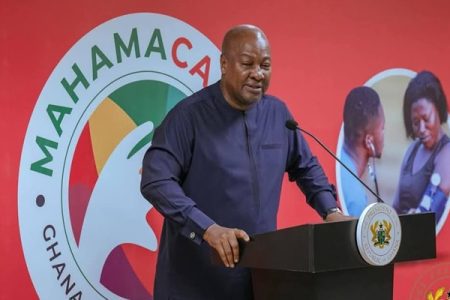In a bold and compassionate move aimed at reshaping Ghana’s healthcare landscape, President John Dramani Mahama has launched the Ghana Medical Trust Fund, also known as Mahama Cares, to support Ghanaians suffering from chronic non-communicable diseases (NCDs).
The launch took place at the University of Ghana Medical Centre (UGMC) in Accra, where the President also donated his six months’ salary to the Fund as a personal gesture of commitment.
The new Fund is a key fulfillment of President Mahama’s 2024 campaign promise and is intended to provide financial relief for Ghanaians burdened by chronic conditions such as cancer, diabetes, cardiovascular disease, kidney failure, stroke, and mental health complications—many of which are currently only partially covered or entirely excluded from the National Health Insurance Scheme (NHIS).
Its support for beneficiaries will be selective, targeting the gaps not currently covered by the National Health Insurance Scheme (NHIS).
This financial burden severely strains households, with over 65% of affected families facing catastrophic health expenditures.
Fund to close gaps in national health insurance
President Mahama described Mahama Cares as a landmark initiative intended to directly confront the growing health and economic impact of chronic illnesses in Ghana.
The Fund will support specialist-level treatment and offer help where the NHIS falls short, with applications reviewed through a formal vetting process to ensure transparency and fairness.
Financing for the Fund will draw from a variety of sources: the uncapped portion of the National Health Insurance Levy (NHIL), direct budgetary support, voluntary contributions from corporate bodies, individuals and institutions, grants, donations, and income generated from strategic investments.
“This is not merely a healthcare initiative—it’s an economic imperative,” President Mahama said.
“Managing chronic conditions imposes crushing financial burdens on families, often pushing them below the poverty line. The Ghana Medical Trust Fund is here to change that story.”
Chronic illness: A growing national crisis
The President painted a sobering picture of the country’s growing NCD crisis.
He revealed that non-communicable diseases are among the top ten causes of death in Ghana, and cited a worrying rise in cancer cases—from 3,487 patients in 2012 to over 16,000 in 2016.
Alarmingly, more than half of these patients fall within the 18 to 45 age group—the most economically productive segment of the population.
“This troubling trend is driven by a convergence of factors: lifestyle changes like tobacco use, alcohol abuse, unhealthy diets, and sedentary behaviour, as well as increasing environmental threats,” he said.
He noted that the average cost of treating a chronic illness in Ghana is about GH¢53,000 ($3,300) annually—an expense that can quickly impoverish even middle-income families.
Individuals battling chronic kidney or heart disease often spend between 70% to 95% of their non-food expenditure on healthcare, while older adults with chronic illnesses spend five times more on healthcare than their healthier peers.
Mahama emphasized that the stakes are high. “It is estimated that individuals diagnosed with chronic diseases face a 75% likelihood of falling into poverty within five years, regardless of their original economic standing.
Even the wealthy are not spared. You spend all your money trying to stay alive.”
A vision aligned with sustainable development goals
Mahama explained that the initiative fits squarely within the global health development agenda, particularly Sustainable Development Goal 3, which aims to ensure healthy lives and promote well-being for all.
SDG Target 3.4 specifically commits countries to reduce premature deaths from NCDs by one-third by the year 2030.
The President added that Ghana, like other low- and middle-income countries, is disproportionately affected by NCDs, making the initiative not just a health program, but a critical tool for promoting economic equity and social justice.
“NCDs do not only kill people. They exacerbate poverty, widen inequality, and slow economic growth,” he said.
A complement to national health strategy
Minister of Health, Mr. Kwabena Mintah Akandoh, described the Fund as a timely and strategic intervention that fits squarely into Ghana’s broader health policy framework.
He said the initiative aligns with key documents such as the National Health Policy 2020, the Roadmap for Attaining Universal Health Coverage (2020–2030), the Essential Health Services Package, and the National Policy on Non-Communicable Diseases (2022).
Mr. Akandoh confirmed that a bill to legally establish the Fund will be submitted to Parliament upon its resumption from recess, solidifying it as a permanent pillar of Ghana’s health financing architecture.
“The Fund not only offers a lifeline to those burdened by chronic illness, it positions Ghana as a leader in compassionate, people-centered healthcare reform,” he said.
Early contributions signal strong national support
The launch event saw several key pledges and donations. Reverend Emeritus Professor Seth Aryeetey, who chairs the National Task Force for the Fund’s establishment, presented a personal donation of $1,000.
He urged Ghanaians from all walks of life to support the initiative in whatever way they can.
Dr. Kwame Anim-Boamah, CEO of the University of Ghana Medical Centre, also pledged GH¢100,000 on behalf of the UGMC. He praised President Mahama’s visionary leadership and his government’s dedication to strengthening the health sector through sustainable, inclusive, and innovative policies.
A new dawn for chronic disease care in Ghana
In his closing remarks, President Mahama made an emotional appeal to Ghanaians to rally around the Fund.
“No Ghanaian should have to choose between staying alive and staying out of poverty,” he said.
“Mahama Cares is not just about medicine—it’s about dignity, justice, and hope.”
With legislation on the horizon and public support already growing, the Ghana Medical Trust Fund marks a new dawn in the fight against chronic illness—a bold step that aims to protect the nation’s most vulnerable while promoting long-term national development.
The Ghana Medical Trust Fund, the Minister said, aligned with Ghana’s key sectoral policy frameworks, including the National Health Policy (2020), Ghana’s Roadmap for Attaining Universal Health Coverage (2020–2030), the Essential Health Services Package (2022–2030), and the National Policy on Non-Communicable Diseases (2022).
Mr Akandoh said a draft bill for the establishment of the Mahama Cares Fund was ready and would be submitted to Parliament immediately after its short recess.
He said the primary obstacle in implementing the Mahama Cares, which was the capping of the National Health Insurance Fund, had been removed.
The World Health Organisation says NCDs are not passed from person to person; they are of long duration and are the result of a combination of genetic, physiological, environmental and behavioural factors.
Available estimates from the WHO indicate that non-communicable diseases remain a leading global health challenge, responsible for 75% of non-pandemic-related deaths worldwide in 2021.
The WHO further reports that low- and middle-income countries continue to bear the heaviest burden, accounting for 73% of all NCD-related deaths, primarily due to cardiovascular diseases, cancers, chronic respiratory diseases, and diabetes.
In Ghana, NCDs account for approximately 43% of all-cause mortality, with a significant rise recorded between 2012 and 2023.
Presently, individuals aged 18–45, the most productive segment of Ghana’s population, constitute over 50% of NCD cases, impacting both public health and economic productivity.
- Disclose Prima Facie evidence in CJ’s case-GBA to Mahama - 29 April 2025
- MTN Ghana records stellar start to 2025 - 29 April 2025
- 65% of teens mining communities abandon school for gold - 29 April 2025

